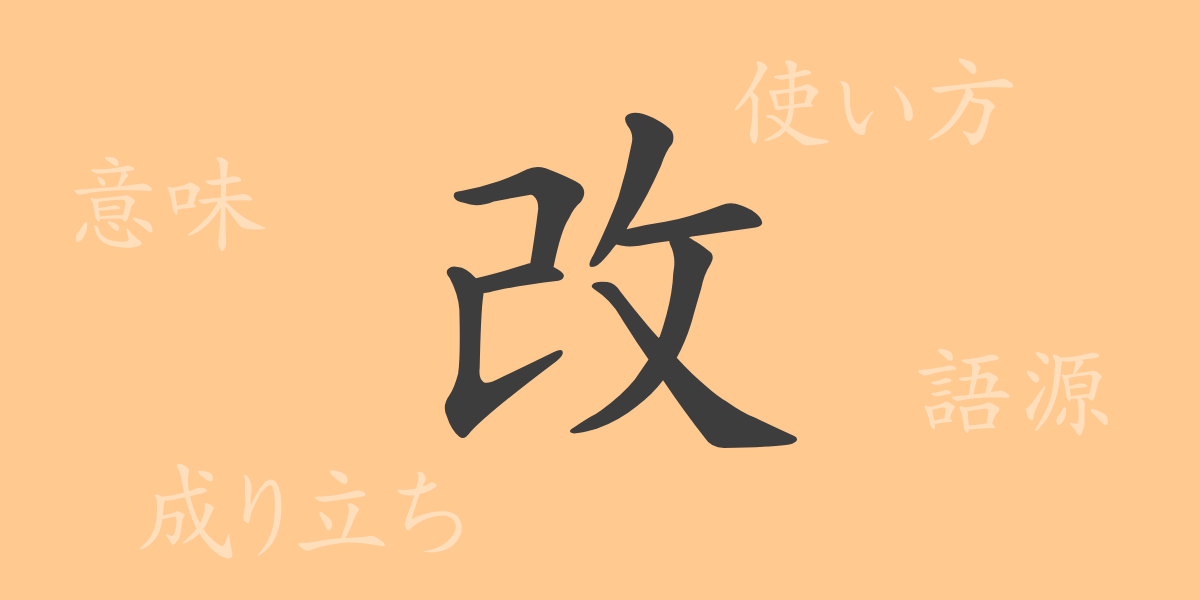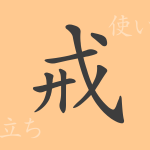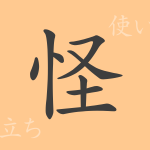The culture of writing in Japan is rooted in Kanji, and among these, the character “改” plays a significant role in everyday life and business settings. This article provides a detailed explanation of the origins, meaning, usage, pronunciation, stroke count, and radical of the Kanji “改”. Additionally, we will introduce idioms, phrases, and proverbs that include “改”. For those aiming to deepen their understanding of the Japanese language, this character may lead to new discoveries.
The Origins (Etymology) of “改”
The Kanji “改” was used in ancient China to mean renewing or making something anew. It has its origins as a pictographic character, originally depicting “self” 己(Onore))with the addition of “攵” (Bokudukuri), representing the idea of changing oneself. Over time, the shape evolved into the current “改”. This Kanji symbolizes positive change, making things new or improving them to a better state.
Meaning and Usage of “改”
The Kanji “改” carries the meaning of “to change”, “to correct”, or “to reform”, and is primarily used when renewing something or changing it for the better. This character is often used to refer to changes or amendments in policies, systems, or attitudes. It is also used in expressions such as “改めて” when specifying dates or times.
Pronunciation, Stroke Count, and Radical of “改”
There are multiple readings for the Kanji “改”, which vary according to its usage.
- Readings: The on’yomi (Chinese reading) is “かい” (Kai), while the kun’yomi (Japanese reading) is “あらた.める” (Aratameru) and “あらた.まる” (Aratamaru).
- Stroke Count: The stroke count for “改” is 7 strokes.
- Radical: The radical is “攵” (Bokudukuri). This radical is often associated with actions and is related to Kanji that carry meanings of change or reform.
Idioms, Phrases, and Proverbs Using “改” and Their Meanings
There are various idioms, phrases, and proverbs that include “改”, such as:
- 改善(Kaizen): To improve things, or the act of improving.
- 改正(Kaisei): To amend laws or systems, making them better.
- 改革(Kaikaku): To make drastic changes to an old system or method, creating something new.
- 改良 (Kairyou): To make incremental improvements to something existing.
- 改めて (Aratamete): An expression used to mean “once again” or “anew”.
- 時勢を改める (Jisei- wo- arata-meru): To transform the course of the times or the state of society.
These idioms, phrases, and proverbs highlight the importance of “改” in the Japanese language and are frequently used to express the necessity for change or progress.
Summary on “改”
The Kanji “改” plays an active role in our language as a symbol of change and progress. Understanding its etymology, meaning, usage, pronunciation, stroke count, and radical can enrich our knowledge of the Japanese language. Idioms, phrases, and proverbs containing “改” are integrated into our everyday expressions and have the power to encourage change through words. Experience the beauty and complexity of the Japanese language through this single character.

























